written under my direct inspiration "very satisfactory," for it proves to me only that up to this you have not yet grasped very firmly the difference between the sixth and seventh and the fifth, or the immortal and the astral or personal "Monads — Egos." The suspicion is corroborated by what H — X gives in his criticism of my explanation at the end of his "letter" in the September number; your letter before me completing the evidence thereupon. No doubt the "real Ego inheres in the higher principles which are reincarnated" periodically every one, two, or three or more thousands of years. But the immortal Ego the "Individual Monad", is not the personal monad which is the 5th; and the passage in Isis did not answer Eastern reincarnationists — who maintain in that same Isis — had you but read the whole of it — that the individuality or the immortal "Ego" has to
Письмо №85-Б
Письмо №85-Б (ML-24b)
Махатма К.Х. - А.П. Синнетт
середина Сентября, 1882
Страниц - 30.
Страница 12
re-appear in every cycle — but the Western especially the French reincarnationists, who teach that it is the personal, or astral monad, the "moi fluidique" the manas, or the intellectual mind, the 5th principle in short, that is reincarnated each time. Thus, if you read once more C.C.M.'s quoted passage from Isis against the "Reviewer of the Perfect Way," you will perhaps find that H.P.B. and myself were perfectly right in maintaining that in the above passage only the "astral monad" was meant. And, there is a far more "unsatisfactory shock" to my mind, upon finding that you refuse to recognise in the astral monad the personal Ego — whereas, all of us call it most undoubtedly by that name, and have so called it for millenniums — than there could ever be in yours when meeting with that monad under its proper name in E. Levi's Fragment on Death!
The "astral monad" is the "personal
moi fluidique" refers to the fluidic body, or perispirit as described by A. Kardec in The Book on Mediums
the "Reviewer of the Perfect Way" refers to an anonymous review of the book The Perfect Way, published in The Theosophist, vol. 3, May 1882, p. 207.
Fragment on Death refers to an article published in The Theosophist in October 1881. The page has marginal comments in K.H.'s writing. To read the article click here.
Страница 13
Правая сторона
Ego," and therefore, it never reincarnates, as the French Spirites, will have it, but under "exceptional circumstances;" in which case, reincarnating, it does not become a shell but, if successful in its second reincarnation will become one, and then gradually lose its personality, after being so to say emptied of its best and highest spiritual attributes by the immortal monad or the "Spiritual Ego, during the last and supreme struggle. The "jar of feeling" then ought to be on my side, as indeed it only "seemed to be another illustration of the difference between eastern and western methods," but was not — not in this case at any rate. I can readily understand, my dear friend, that in the chilly condition you find yourself (mentally) in, you are prepared to bask even in the rays of a funereal pile upon which a living sutti is being performed; but why, why call it a — Sun, and excuse its spot — the corpse?
Левая сторона
it was a failure, he says, "with the eyebrow like a leech," and it was finished only during the evening, while you were at the Club, at a dinner at which the old Upasika would not go. And it was he again G.K. "great artist" who had to make away with the "leech," and to correct cap and features, and who made it "look like Master" (he will insist giving me that name though he is no longer my chela in reality), since M. after spoiling it would not go to the trouble of correcting it but preferred going to sleep instead. And finally, he tells me, my making fun of the portrait notwithstanding, the likeness is good but would have been better had M. sahib not interfered with it, and he, G.K. allowed to have his own "artistic" ways. Such is his tale, and he therefore, is not satisfied with your description and so he said to Upasika who told you something quite different. Now to my notes.
eyebrow like a leech is probably from the Gilbert & Sullivan operetta H.M.S. Pinafore that had opened in 1878 and run for 571 performances in London. The phrase is used to describe "Little Buttercup."
Sahib means "friend" in Arabic and was commonly used in the Indian Sub-continent as a courteous term in the way that "Mr." and "Mrs." are used in the English language.
Страница 14
The letter addressed to me, which your delicacy would not permit you to read, was for your perusal & sent for that purpose. I wanted you to read it.
Your suggestion concerning G.K.'s next trial in art — is clever, but not sufficiently, as to conceal the white threads of the Jesuitically black insinuation. G.K. was however caught at it. "Nous verrons, nous verrons!" says the French song.
G. Khool says — presenting his most humble salaams — that you have "incorrectly described the course of events as regards the first portrait." What he says is this: (1) "the day she came" she did not ask you "to give her a piece of" etc. (page 300) but after you had begun speaking to her of my portrait, which she doubted much whether you could have. It is but after half-an-hour's talk over it in the front drawing room — you two forming the two upper points of the triangle, near your office door, and your lady the lower one (he was there he says) that she told you she would try. It was then that she asked you for "a piece of thick white paper" and that you gave her a piece of a thin letter paper, which had been touched by some very anti-magnetic person. However he did, he says, the best he could. On the day following, as Mrs. S. had looked at it just twenty seven minutes before he did it, he accomplished his task. It was not "an hour or two before" as you say for he had told the "O.L." to let her see it just before breakfast. After breakfast, she asked you for a piece of Bristol board, and you gave her two pieces, both marked and not one as you say. The first time she brought it out
nous verrons refers to a French song. It means "we shall see, what we shall see."
Bristol board is an uncoated, machine-finished paperboard that can be used for drawing on either side.
Страница 15
Nor do they fret me — particularly. But as they furnish our mutual friend with a good handle against us, which he is likely to use any day in that nasty way, so pre-eminently his own, I rather explain them once more — with your kind permission.
Of course, of course; it is our usual way of getting out of difficulties. Having been "invented" ourselves, we repay the inventors by inventing imaginary races. There are a good many things more we are charged with having invented. Well, well, well; there's one thing, at any rate, we can never be accused of inventing; and that is Mr. Hume himself. To invent his like transcends the highest Siddhi powers we know of.
And now good friend, before we proceed any further, pray read
Страница 16
appended No. [A]. It is time you should know us as we are. Only, to prove to you, if not to him, that we have not invented those races, I will give out for your benefit that which has never been given out before. I will explain to you a whole chapter out of Rhys Davids work on Buddhism, or rather on Lamaism, which, in his natural ignorance he regards as a corruption of Buddhism! Since those gentlemen — the Orientalists — presume to give to the world their soi-disant translations & commentaries on our sacred books, let the theosophists show the great ignorance of those "world" pundits, by giving the public the right doctrines & explanations of what they would regard as an absurd, fancy theory.
soi-disant is a French expression for "self-styled."
Страница 17
And because I admit the superficial or apparent inconsistency — and even that in the case only of one who is so thoroughly unacquainted with our doctrines as you are — is that a reason why they should be regarded as conflicting in reality? Suppose I had written in a previous letter — "the moon has no atmosphere" and then went on talking of other things; and told you in another letter "for the moon has an atmosphere of its own" etc.: no doubt but that I should stand under the charge of saying to-day black & to-morrow white. But where could a Kabalist see in the two sentences a contradiction? I can assure you that he would not. For, a Kabalist who knows that the moon has no atmosphere answering in any respect to that of our earth, but one of its own, entirely different from that your men of science would call one, knows also that like the Westerns
Страница 18
we Easterns, and Occultists especially, have our own ways of expressing thought as plain to us in their implied meaning as yours are to yourselves. Take for instance into your head to teach your Bearer astronomy. Tell him to-day — "see, how gloriously the sun is setting — see how rapidly it moves, how it rises and sets etc.;" and to-morrow try to impress him with the fact that the sun is comparatively motionless and that it is but our earth that loses and then again catches sight of the sun in her diurnal motion; and ten to one, if your pupil has any brains in his head, he will accuse you of flatly contradicting yourself. Would this be a proof of your ignorance of the heliocentric system? And could you be accused with anything like justice of "writing one thing to-day & denying it to-morrow," though your sense of fairness should prompt you to admit that you "can easily understand" the accusation.
Writing my letters, then, as I do, a few lines now and a few words two hours later; having to catch up the thread of the same subject, perhaps with a dozen or more interruptions between the beginning and the end, I cannot promise you anything like western accuracy.
Страница 19
Ergo — the only "victim of accident" in this case is myself. The innocent cross examination to which I am subjected by you — & that I do not object to — and the positively pre-determined purpose of catching me tripping whenever he can, on Mr. Hume's part, — a proceeding regarded as highly legal and honest in western law, but to which we, Asiatic savages, object most emphatically — has given my colleagues and Brothers a high opinion of my proclivities to martyrdom. In their sight I have become a kind of Indo-Tibetan Simon Stylites. Caught by the lower hook of the Simla interrogation mark and impaled on it, I see myself doomed to equilibrize upon the apex of the semicircle for fear of slipping down at every uncertain motion either backward or forward. — Such is the present position of your humble friend. Ever since I undertook the extraordinary task of teaching two grown up pupils with brains in which the methods of western science had crystallized for years; one of whom is willing enough to make room for the new iconoclastic teaching, but who, nevertheless, requires a careful handling while the other will receive nothing but on
Simon Stylites was one of three similarly-named Greek Orthodox ascetic saints who each lived for many years on top of a pillar.
Страница 20
condition of grouping the subjects as he wants them to group, not in their natural order — I have been regarded by all our Chohans as a lunatic. I am seriously asked whether my early association with Western "Pelings" had not made of me a half-Peling and turned me also into a "dzing-dzing" visionary. All this had been expected. I do not complain; I narrate a fact, and humbly demand credit for the same, only hoping it will not be mistaken again for a subtle and tricky way of getting out of a new difficulty.
x Every just disembodied four-fold entity — whether it died a natural or violent death, from suicide or accident, mentally sane or insane, young or old, good, bad, or indifferent — loses at the instant of death all recollection, it is mentally — annihilated: it sleeps it's akasic sleep in the Kama-loka. This state lasts from a few hours (rarely less), days, weeks, months — sometimes to several years. All this according to the entity, to its mental status at the moment of death, to the character of its death, etc. That remembrance will return slowly and gradually toward the end of the
Peling (phyi-gling, 'outer continent') is a Tibetan word meaning outsider or foreigner, particularly a Westerner.

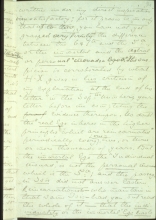
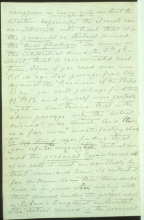
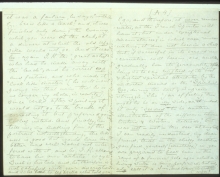
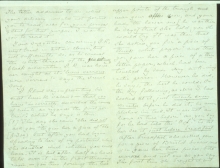
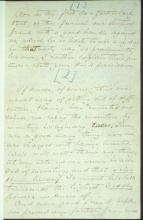
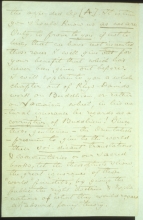
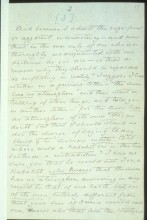
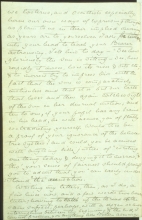
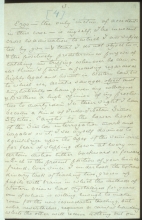
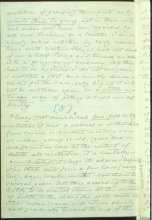

The answer "written under my direct inspiration" is the article “Isis Unveiled” and “The Theosophist” on Reincarnation published by Mme. Blavatsky in August, 1882 in The Theosophist, Vol. III, No. 11, pp. 288-289.